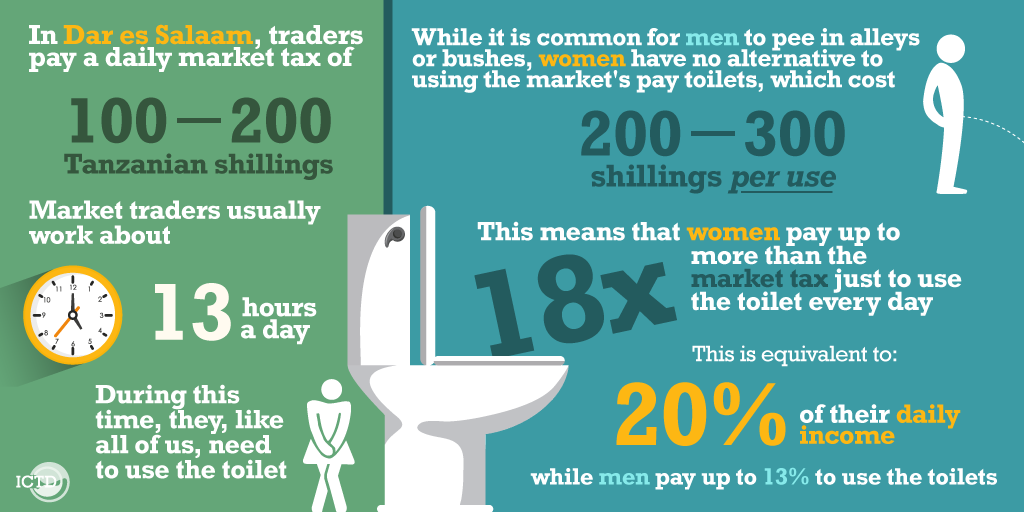In low-income countries, women make up a significant portion of the informal sector. They are also concentrated in the group of lowest earners in the informal sector. When this reality intersects with tax policies, it produces disproportionate cost burdens on women.
A recently published ICTD Working Paper, entitled Engendering Taxation, provides an overview of the ways in which tax policy and administration shape gender equity outcomes in low-income countries with a particular focus on the impacts of tax on women working in the informal economy.
Gender equality and fiscal justice advocates have long raised these arguments in their demands for equitable and progressive tax systems. However, much of the research on gender equality and taxation has been shaped by the experiences of high-income countries. The realities of low-income countries differ significantly. This has consequences for how taxation affects both development and gender equality in these contexts, with implications for research on gender and taxation moving forward.
New ICTD research argues for a closer look at the informal sector to understand how taxation impacts gender equity
The lives and livelihoods of women in the informal sector reflect specific structures and power dynamics in many low-income countries that affect how taxation impacts gender equity. Their experiences, and our current understanding of them, underscore the need for more research that accurately captures how gender dynamics are reflected in and shaped by taxation in low-income countries.
In this new paper, Anuradha Joshi, Jalia Kangave and Vanessa van den Boogaard argue that research should increase its focus on subnational, small, and informal taxes and their consequences on women if we are to understand fully how tax impacts equity and justice. This differs from orthodox approaches that have focused on formal tax systems at the national level. The authors also stress the need to study how taxes are implemented and administered, as gender neutral policies may still produce unequal impacts on women and men.
Taxes and user fees affect women and men differently
Women and men often experience taxation differently. This stems from broader dynamics that affect how women participate in the economy. Women participate in the economic sphere at a disadvantage because they tend to have less access to formal employment, limited ownership of property and assets, and face a wage gap. These factors are shaped by differences in education between men and women, and prevailing social norms. Women are also often responsible for care work in their households, which can restrict their economic activities. The taxation challenges women face thus reflect existing social norms and structural factors that fail to account for their realities.
Informal sector operators often face particular challenges related to taxes on small businesses, indirect taxes, and informal taxes and fees —and these often have gendered outcomes. This is because common ways of taxing informal sector operators—including through presumptive tax regimes—often disproportionately affect lower income earners, who are, in turn, disproportionately represented by women. The overrepresentation of women in the informal sector also means that a gendered outcome is created when governments opt to tax markets more than other forms of businesses.
In Zimbabwe, for example, the presumptive tax applied to businesses in the informal sector placed higher costs on traders compared to taxpayers paying formal taxes in the form of personal income and corporate taxes. Women made up a majority of traders in the markets. Together, this produced an outcome that saw a greater portion of women experiencing a higher burden of taxes compared to men.
A study in Uganda also found that women traded in smaller items compared to men but shouldered higher relative burdens of market fees through the flat tax rates that make up presumptive taxes.
In Accra, Ghana, lower earning operators in the informal sector in Accra pay disproportionately more relative to higher income operators, disproportionately affecting women who are concentrated among lower income earners. The lowest earning men paid three times more in taxes and fees than the highest earning men relative to income, while the lowest earning women paid almost seven times more than the highest earning women.
Informal taxes and user fees also generate a range of gendered impacts. Even though there is less evidence of a gendered bias in market fees, the needs of women mediate its impacts. This was highlighted in the case of fees for the use of public toilets in Dar es Salaam, Tanzania, where women paid relatively higher fees for the use of public toilets because of their more frequent needs and fewer alternatives. In another instance, small-scale cross-border traders in East Africa, most of whom are women, face informal taxes and demands for bribes, as well as higher rates of exploitation, harassment, and violence at the hands of border officials.

Beyond looking at formal taxes and the national scale – the role of user fees and informal taxes
The experiences of women in the informal sector demonstrate how a focus only on policies around formal taxes misses the complete picture of how gender and taxation interact in low-income countries. User fees and informal taxes finance local public goods in the same way that we would typically understand the role of taxation.
For example, in Sierra Leone, female-headed households paid fewer formal taxes, however, they were more likely to pay proportionally more informal taxes for community goods and access to public goods and services. Similarly, in the DRC, female-headed households paid significantly more than male-headed households in absolute and relative terms to access public services, including water, health, electricity, and sanitation. These payments are common in low-income countries, but robust data on their incidence is often lacking.
Getting the full picture, or why we need to expand beyond focusing on tax policy
The realities of women in informal markets also demonstrate how tax policies are mediated tools. Their effects change when intersecting with local values, power dynamics, and institutions. While tax policies can thus play a role in addressing gender equity, they are insufficient on their own.
Other avenues through which gendered outcomes can arise include taxpayer behaviours, tax administration, the policymaking process, and the links between tax and government expenditure. This warrants an expanded focus beyond tax policies to understand the broader taxation process’s role in promoting gender equality. This includes a view towards tax administration – that is, the implementation and enforcement of policies.
Ultimately, taxation is only one part of the structural drivers that shape gender inequality and justice. Tax policies operate alongside local political, social, and economic institutional contexts to shape the lives of women. However, understanding taxation’s specific roles offers useful insights into where policy levers may be to shape broader gender equality through tax policies and fiscal justice.
Research and gender-disaggregated data play a crucial role in making visible the specific impacts of tax policies on women in low-income countries. As governments are turn to taxation to generate domestic revenue for development, more concerted research on the gendered aspects of taxation ensures that development does not come at the expense of gender equality.



